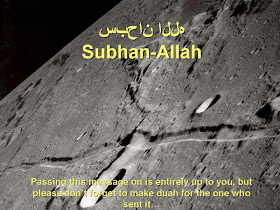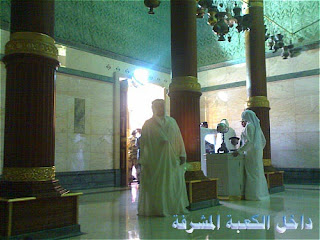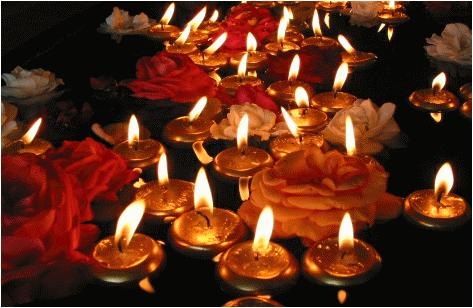THE OBLIGATION OF FASTING
Allah says in the Quran:
"O uou who have faith! Fasting is prescribed for you as it was prescribed for those before you - so that hopefully you will have taqwa." - Al Baqarah(2):183
Meaning that hopefuly you can safeguard yourselves from the Fire through Fasting; fasting is a means to the forgiveness of sins, and sins lead one to the fire.
The two sahihs record the hadith in which the prophet (pbuh) said:
"Islam is built upon five: that you worship Allah and reject the worship of anything else, to establish the prayer, the giving of Zakat, performing pilgrimage to the house and Fasting the month of Ramadan." [This is the wording of Muslim, Bukhari has the first sentence as 'that you testify none has the right to be worshipped save Allah'].
THE VIRTUES OF FASTING
Fasting carries with it a number of benefits, amongst which are: the elevation to ones rank, the expiation of sins, the breaking of ones desire and lusts, the increase of charity, the multiplication of actions of obedience to Allah, giving thanks to the one who knows the hidden matters, and preventing oneself from even contemplating the commiting of sin.
THE ELEVATION OF RANK
With regards to the elevation of rank, the Messenger of Allah (pbuh) said:
"When Ramadan comes, the gates of Paardise are opened, the gates of Hellfire are locked and devils are chained." [Bukhari]
He (pbuh) also said, relating from his lord Mighty and Magnificient,
"All of the actions of the son of Adam are for him except the fast for that is for me and I will reward it. Fasting is protecting sheild, so when it is the day when one of you are fasting, let him not behave or speak indecently; if someone tries to abuse him or fight him, let him say, 'I am fasting'. By the one in whose hand is the soul of Muhammad, the smell emanating from the mouth of the one fasting is better with Allah then the smell of musk. The one fasting has tewo time of joy, when he breaks his fast he is happy and when he meets his lord he will rejoice at his fasting." [Bukhari and Muslim]
The prophet (pbuh) also said:
"Every action that the son of Adam does, [its reward] will be multiplied, a good deed will be increased tenfold. Allah Mighty and Magnificient says, 'except for the fast, for that is for Me and I will reward it for he left his desires and food for My sake'" [Muslim]
The prophet (pbuh) also said:
"In paradise there is a gate which is called ar-Rayyan through which the people who fasted will enter on the day of Judgement, and no one else shall enter along-side them. It will be asked, 'where are those who fasted?' and they will walk through it, and upon the entry of the last of them, it will be locked, and no one else will walk through it." [Bukhari and Muslim]
With regards the 'opening of the gates of paradise', this is a phrase that points to the increase of actions of obedience that in turn lead to the opening of the gates of Paradise. 'Locking the gates of Fire' is a phrase that points to the decrease, and lack of therewith, of sins which in turn leads to the locking of the gates of the Fire. 'The chaining of the devils' is a phrase that points to the termination of their whisperings, and temptations, to those who are fasting because they give up hope of receiving a favorable response.
His saying, "All of the actions of the son of Adam are for him except the fast for that is for me, and I will reward it," fasting has been specifically adjoined to him in the order of Honour it because the hidden nature of fasting prevents ostentation entering it, and moreover, hunger and thirst are not used as means to draew closer to any king of this world nor any idol.
QURAN
Ramadan is the month in which the Quran was revealed with clear guidance and differentiation (Between Good and Bad) Whoever of you is a witness of this month, should fast. But if anyone is ill, or on a journey, the prescribed period (Should be made up) by days later. Allah intends every facility for you; He does not want to put you in any difficulties. 2:185 And eat and drink, until the white thread of dawn appears to you distinct from it’s black thread; then complete your fast till the night appears. 2:187HADITH
Whoever fasts Ramadan with faith and seeking the pleasure of Allah, his past errors are forgiven. (Ahmed) Islam is based on the five pillars, the oneness of Allah, establishing prayers, paying Zakat (Charity) fasting in Ramadan and pilgrimage to Makkah. Fast when you see the new moon of Ramadan, and finish fasting when you see the new moon of Shawal, and if you cannot see the new moon then calculate thirty days of Shaban.RAMADAN
The month of Ramadan comes once each year giving every fasting Muslim a spiritual and physical improvement which lasts until the following year.CHARITY
To be homeless without a place to live and to loose your family or the home you were born in or to loose your spouse or children is a terrible thought. Yet this is what many Muslim brothers and sisters face each winter. We see this happening daily on TV or in the newspapers. "Every little bit helps", whatever you donate this Ramadan, it will give someone a chance to live or hope for a better future.ZAKAT-A-FITR
This is a charity that must be paid at the end of Ramadan and only then is your fasts accepted.ZAKAT-AL-MAL
This is a charitable tax which must be paid every year based upon your wealth. To do this during Ramadan is more rewarding.
Blessings & Benefits Of Fasting
THE MONTH OF RAMADHAAN IN WHICH WAS REVEALED THE QUR'AAN, A GUIDANCE FOR MANKIND AND CLEAR PROOFS FOR THE GUIDANCE AND CRITERION (BETWEEN RIGHT AND WRONG).
SO WHOEVER OF YOU IS PRESENT DURING THIS MONTH SHOULD OBSERVE ITS FAST. AL QUR'AAN
After Imaan, Salaah and Zakaah, the most important pillar of Islaam is Sawm (Fasting) during the month of Ramadhaan (the 9th month of the Islaamic calendar). Fasting in the month of Ramadhaan is amongst the fundamentals of Islaam; one who denies its obligation goes out of the fold of Islaam. One who does not fast during this month is a faasiq (an immoral and flagrant transgressor)of the highest degree. Such a faasiq completely destroys his spirituality and morality.
Sawm literally means 'to abstain’. But in the terminology of the Sharee'ah, it means 'to refrain from eating, drinking and cohabitation from sub'h saadiq to sunset, with the intention of fasting’.
Fasting during the month of Ramadhaan, was ordained on the Ummah of Muhammad sallallahu alayhi wasallam after the revelation of the above mentioned verse in the 2nd year of our Prophet's sallallahu alayhi wasallam migration to Madeenah.
Before fasting in the month of Ramadhaan was made compulsory, our Prophet sallallahu alayhi wasallam would fast on the 10th of Muharram, instructing the Sahaabah radhiyallahu anhum to follow suit. But once the fasting of Ramadhaan became obligatory, fasting on the 10th of Muharram was made optional. It is reported in Bukhaari Shareef, on the authority of ‘Aa’ishah and Abdullah Ibne Umar radhiyallahu anhumaa that when the Messenger of Allah sallallahu alayhi wasallam came to Madeenah, he commanded the people to fast on the 10th of Muharram, but when fasting during the month of Ramadhaan was made compulsory, our Prophet sallallahu alayhi wasallam said, "Now fasting on the 10th of Muharram is optional."
There are numerous spiritual benefits of fasting. Fasting is extremely efficient for the acquisition of taqwaa (piety), without which a Muslim cannot gain closeness to Allah. The prime benefit in the pursuit of taqwaa is the suppression of the erratic desires and demands of nafs (based carnal desire), which is always working in collusion with Shaytaan, to spiritually and morally ruin the believer. If the nafs is allowed freedom, then it will succeed in making man a slave of lust, passion and base emotions, due to which his Imaan will suffer. Therefore, it is essential that the nafs be restrained. Fasting greatly aids towards pursuing this objective. By fasting, a Muslim learns to suppress his lowly desires. Thus the ability of inculcating taqwaa is created. Further, fasting purifies the soul, and creates gratification in worship, making the heart conducive for worship. The bond with Allah is also strengthened. Once our beloved Prophet sallallahu alayhi wasallam supplicated, "O Lord of the universe! When does the servant become closest to you?" The Divine Reply came, "When the servant is hungry and when he is in sajdah (prostration)."
Another outstanding feature of fasting is that it lifts man above the level of beasts and animals - who eat, drink and copulate at will, whenever the urge comes - and takes him to the parallel of the angels. Since the latter do not eat or drink, they are devoid and free of evil inclinations and all things base. Man, by reducing his worldly relations and emotional desires, moves himself to the realms of the angels.
As well as the many spiritual benefits of fasting, there are physical benefits and advantages of fasting too. Notably, feeling for the poor and hungry is engendered. Man becomes more aware and conscious of his less fortunate brethren and their deprivation, which in turn teaches him to sacrifice his wealth and assist others in need. Thus feeling for humanity is generated and inculcated in man.
There are innumerable Ahaadeeth of the Prophet sallallahu alayhi wasallam which illustrate great virtue and blessing for the fasting person.
- Sahl Ibne Sa'd radhiyallahu anhu narrates from our Prophet sallallahu alayhi wasallam that he said, "Verily! In Jannah, there is a door called ‘Ar Rayyaan’, through which will enter the fasting people on the Day of Judgement. No one will enter through this door besides them. It will be announced, 'Where are the fasting people?' They will stand (and enter). No one will enter besides them. Once they will enter, the door will be locked so no one can enter through it (after them)."
(Bukhaari, Muslim)
- Aboo Hurayrah radhiyallahu anhu reports from our beloved Prophet sallallahu alayhi wasallam, that he said, 'Allah says, 'Every deed of Ibne Aadam (son of Aadam) is for him, except for fast. Verily, fasting is for me, and I shall (personally) apportion out the reward for it."' It is further said, "For a fasting person, there are two pleasures, which please him. When he eats upon completing the fast, he becomes happy, and when he will meet his Lord he will be pleased due to his fast."
(Bukhaari)
- Aboo Hurayrah radhiyallahu anhu narrates from our beloved Prophet sallallahu alayhi wasallam that he said, "One who keeps the fast of Ramadhaan with Imaan (faith) and longing for reward, all his previous sins are forgiven."
(Bukhaari, Muslim)
For the acquisition of the numerous virtues and benefits of fasting, there is however, one essential condition: a person takes extra precaution in making sure he abstains from sin and futility. A person should spend much of his time in the recitation of the Qur'aan and also engage himself in the constant Remembrance of Allah. If one does not abstain from sin and futility then his fasting will merely be staying hungry and thirsty, without any reward or spiritual upliftment.
A few common evils, which are regarded lightly, but are very detrimental to a fasting person, should be taken into consideration and avoided totally:
- Telling lies.
- Backbiting.
- Quarrelling.
- Eating haraam items.
- Earning through unlawful means.
- Any act which may harm or cause grief to a person.
In short, a person should try to refrain from all kinds of sins - protecting his ears, eyes, tongue and all other organs from indulging in unlawful activities. When a Muslim spends his Ramadhaan in this manner then he will notice great changes in his life. Spiritual strength will be gained, which will facilitate him to conduct his life according to Islaam, together with Allah's Pleasure.



































